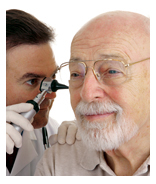Diabetes Dateline
Fall 2008
Hearing Loss Common in People with Diabetes
 Hearing loss is about twice as common in adults with diabetes, according to a study funded by the National Institute of Diabetes and Digestive and Kidney Diseases (NIDDK) at the National Institutes of Health (NIH). Hearing loss is about twice as common in adults with diabetes, according to a study funded by the National Institute of Diabetes and Digestive and Kidney Diseases (NIDDK) at the National Institutes of Health (NIH).
Researchers discovered the higher rate of hearing loss among those with diabetes after analyzing the results of hearing tests given to a nationally representative sample of U.S. adults. The tests measured participants’ ability to hear low-, middle-, and high-frequency sounds in both ears.
Mild or greater hearing impairment of low- or mid-frequency sounds in the worse ear was about 21 percent in 399 adults with diabetes compared with about 9 percent in 4,741 adults without diabetes. For high-frequency sounds, mild or greater hearing impairment in the worse ear was 54 percent in those with diabetes compared with 32 percent in those without the disease.
Adults with pre-diabetes whose blood glucose, also called blood sugar, is higher than normal but not high enough for a diabetes diagnosis had a 30 percent higher rate of hearing loss of high-frequency sounds compared with those who had a normal blood glucose test after an overnight fast.
The researchers analyzed data from hearing tests given to participants from 1999 to 2004 in the National Health and Nutrition Examination Survey (NHANES) conducted by the National Center for Health Statistics, part of the Centers for Disease Control and Prevention. Half of the 11,405 survey participants ages 20 to 69 were randomly assigned to have their hearing tested: nearly 90 percent of them completed the hearing exam and a diabetes questionnaire that included questions about hearing loss. In addition, 2,259 of the participants who received hearing tests were randomly assigned to have their blood glucose tested after an overnight fast.
The research was conducted by scientists from the NIDDK, the National Institute on Deafness and Other Communication Disorders (NIDCD), components of the NIH, and Social and Scientific Systems, Inc., which provides support on public health topics to Government agencies.
“Hearing loss may be an under-recognized complication of diabetes,” said Catherine Cowie, Ph.D., senior study author and director of the NIDDK’s diabetes epidemiology program. “As diabetes becomes more common, the disease may become a more significant contributor to hearing loss,” said Cowie, who suggested that people with diabetes consider getting their hearing tested. “Our study found a strong and consistent link between hearing impairment and diabetes using a number of different outcomes.”
Weaker Link
Earlier U.S. studies that examined diabetes and hearing loss found a weaker association or no association, but these studies were based on smaller samples of older adults and they were not nationally representative, according to study coauthor Howard Hoffman, epidemiology program director at the NIDCD.
“This is the first study of a nationally representative sample of working-age adults, 20 to 69 years old,” said Hoffman, “and we found an association between diabetes and hearing impairment evident as early as ages 30 to 40.”
Diabetes may lead to hearing loss by damaging the nerves and blood vessels of the inner ear, researchers suggest. Autopsies of people with diabetes have indicated such damage.
“The link between diabetes and hearing loss has been debated since the 1960s or before, and our results show that a relationship exists even when we account for the major factors known to affect hearing, such as age, race, ethnicity, income level, noise exposure, and the use of certain medications,” said Kathleen Bainbridge, Ph.D., lead author of the study.
Study results were published online on June 17, 2008, in the Annals of Internal Medicine. For more information about the causes, prevention, and treatment of diabetes, visit www.diabetes.niddk.nih.gov.
[Top]
NIH Publication No. 09–4562
December 2009
|




